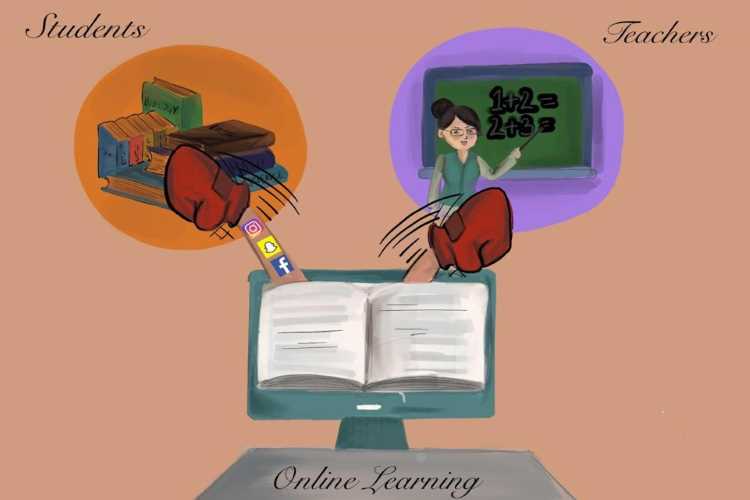By Dhaarna Bhardwaj
Never before in history had an entire generation of children across the world witnessed a similar disruption in education. As India witnessed the world’s most aggressive and largest lockdown as a preventive measure for Covid-19, academic institutions initiated online classes to cope up with the new normal. Corona pandemic has pushed the world into an unprecedented education emergency.
This abrupt switch to online schooling has been frustrating for all stakeholders, right from school managements to teachers to student and parents. A majority of teachers were ill-prepared to switch to online classes as they lacked the technological expertise or resources, some even had an apathy towards online teaching initially.
READ I Covid-19 explainer: All you need to know about how coronavirus is transmitted
Not only that this it was nightmarish for some who faced unwanted intrusion by the peeping or argumentative parents, inappropriate remarks by students during classes and pranks played by students who would make false ID and enter the class as parent or relative made it difficult all the more.
Teachers, whether in government or private setups, had their own set of challenges. Private school teachers were more perturbed by online bullying by students and intrusion by parent or relatives whereas government school teachers had a greater challenge of imparting classes to students belong to economically weaker sections who did not own a smart phone or a basic mobile. The report “Save Our Education” citing data by UNESCO claimed that a whopping 9.7 million children will drop out of school permanently with no access to online education. It’s the poorest and most marginalised children who would suffer the greatest loss.
READ I Govt agencies push online learning, disregard official data
Researches also suggest that online education (Massive Open Online Courses, or MOOCs) has not lived up to expectations. This is not surprising as earlier attempts such as education by radio and television could not meet the expectations. This time definitely has been nightmarish for educators as the online classes are here to stay and they have to best ignore the misconduct of students during classes.
Online bullying by teenagers is very common, say teachers. Students create fake IDs and enter the classroom as a parent to confuse teachers and create a ruckus. Often privacy norms are not followed and parents are seen roaming around in their night dresses during classes. Sudden guest appearance of mothers or domestic helps leaves the class in splits and disrupts the flow of the classroom. Trolling teachers by sending memes or calling names is nothing unusual, say teachers. Sharing of messages and name-calling cannot be traced during online zoom classes leaving no other option but to continue with classes.
READ I Great lockdown: Online classes, remote working widen India’s digital divide
Most of the teachers are having a tough time adjusting to this new norm. At times, some parents peep in just to see how the teacher is taking the class, ruining the classroom atmosphere. Some parents even record sessions and argue with teachers. Some students also keep on using their mobiles to post on TikTok, Instagram or WhatsApp during online classes or even doze off by switching off the camera.
For effective online teaching, these 4Cs are crucial:
- Concern for learning
- Communication with students
- Consideration or flexibility
- Consistent follow up
In online learning, communication, which is the lifeline of teaching often gets disrupted due to multiple reasons including internet connectivity, inattentive and disengaged students, intrusion from parents or rowdy student behaviour towards teachers or each other. Students often excuse themselves from classes by blaming poor internet connectivity and miss classes. More difficult is the situation of Primary teachers who have to also deal with the children running away and playing or getting easily distracted during online classes.
READ I Online learning is the new normal; government must ensure access to all
It is important that the parents cooperate with educators by providing a distraction-free study corner and help them follow a daily schedule. It is important to be role models and show case right online behaviour to our children.
Silverlining in the cloud
Online teaching has also been positive in the sense that it has provided a platform for students to feel freer to discuss their personal challenges with teachers – a practice they usually avoid in front of their peers in normal classroom settings.
Teachers admit that students express their frustrations, adjustments or mishaps related to personal and family life in private chat conversations more freely now. There is also a lot of opportunity as teachers who take the work seriously and innovate have become overnight internet sensations.
Incorporating a sense of community and compassion
- Begin the class by checking in what is going on in students’ lives.
- Organizing a weekly theme-based discussion forum where students share their personal experiences, artwork, photographs or video/audio clippings which reflect their state of mind.
- Creatively develop new ways of peer-to-peer support.
- Reaching out to the onscreen students by transcending barriers and create belongingness.
- Develop engaging and interactive content which stimulates students to research further and be alive in classroom discussions.
- Integrating curriculum with life skills so that students stay resilient in tough times and are able to nurture social connections.
(Dr Dhaarna Bhardwaj is a psychotherapist and founder of Pratiiti Luminaries. Anushka Mehta is currently interning with Pratiiti Luminaries.) (www.pratiiti.com)

